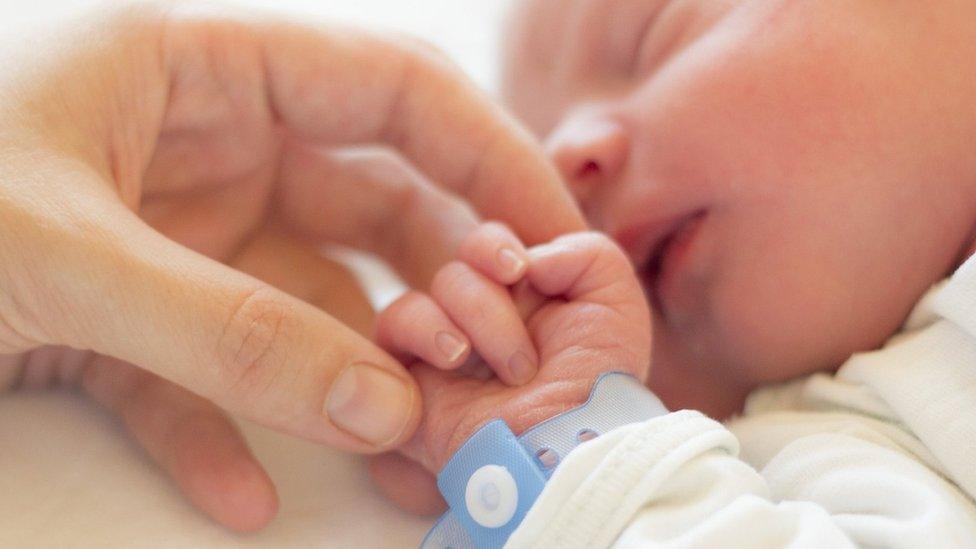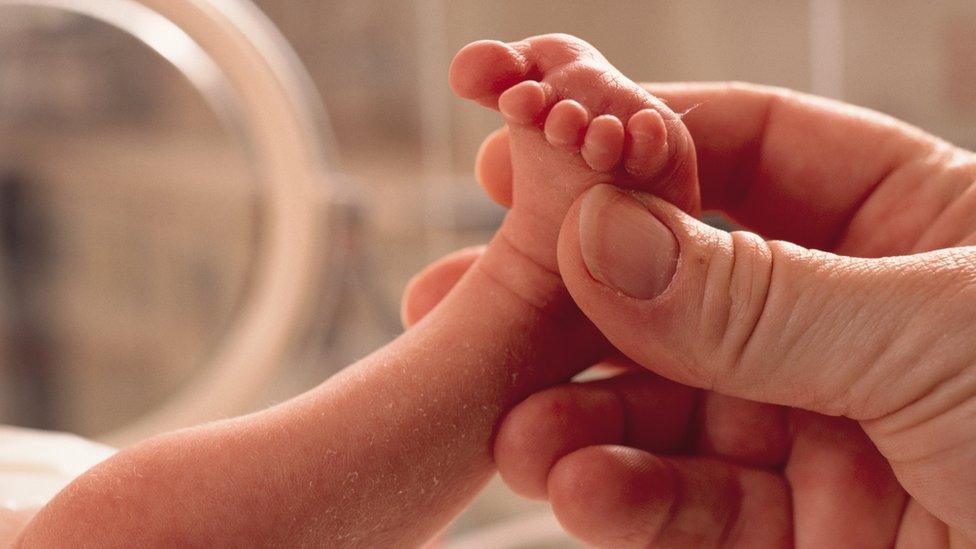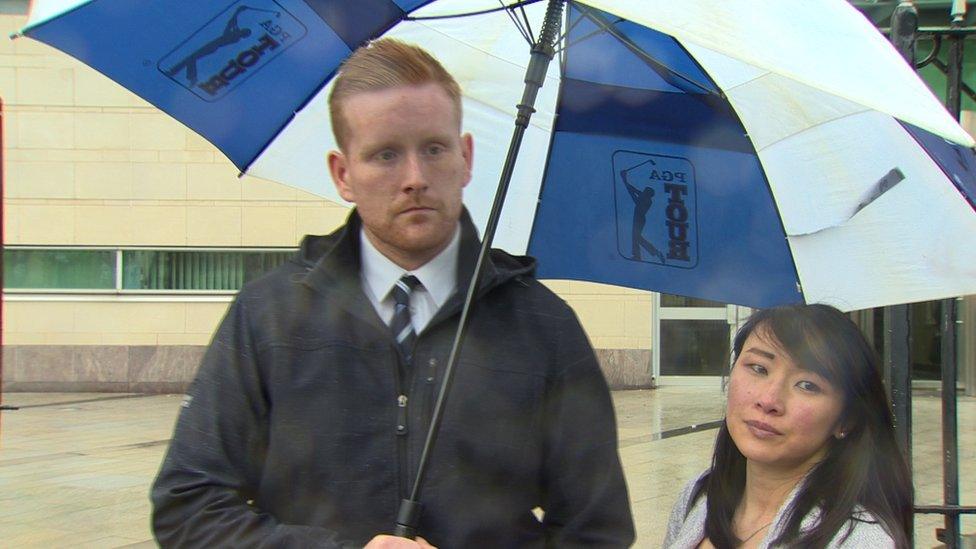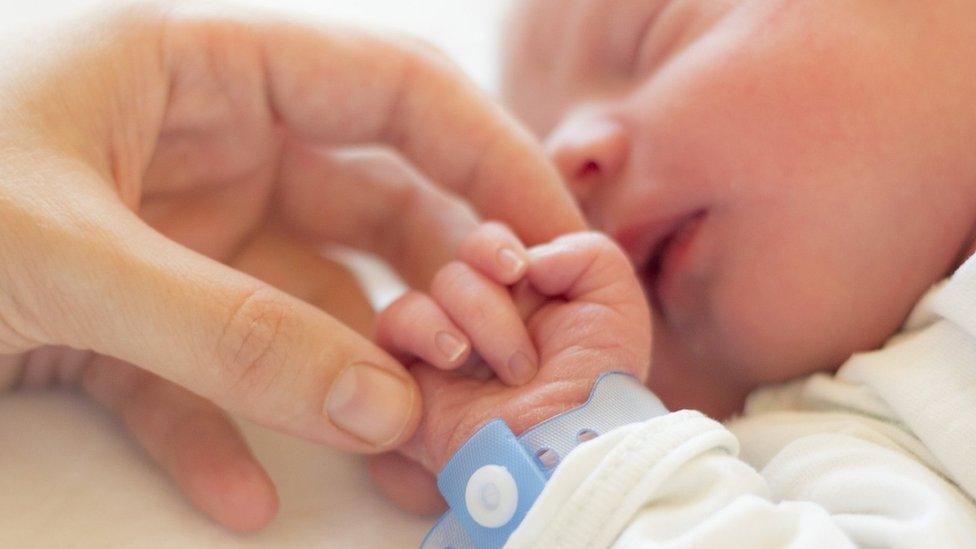Group B Strep: NI parties call for mothers-to-be screening
- Published

Northern Ireland's politicians have jointly called for Group B Strep screening for all pregnant women.
Group B Strep is the most common cause of serious infection in newborn babies in the UK.
A cross-party letter has been sent to Department of Health officials.
It says it is unacceptable that a baby born in Northern Ireland has a higher chance of developing the infection than one born elsewhere.
The letter was prompted by the death of Hollie Maguire shortly after her birth in Belfast's Royal Victoria Hospital in 2016 from congenital pneumonia.
At her inquest last month, her parents, Brendan Maguire and Susan Ho-Maguire from Dunmurry, warned other mothers-to-be to take a simple test for the Group B Streptococcus bacteria that caused their daughter's death.
Group B Strep is also one of the leading causes of neonatal pneumonia, sepsis and meningitis.
On average, two babies each day in the UK develop a Group B Strep infection and each week one baby dies.

What is Group B Strep?
Each year in the UK, between 400 to 500 babies are born with Group-B streptococcus (GBS) - a bacteria which can cause serious illness or death in newborns.
Most will fully recover with treatment, but GBS can lead to pneumonia, meningitis and a dangerous blood infection called sepsis.
About 150,000 pregnant women - one in five - carry GBS and if it is undiagnosed, there is a chance they could pass it to their baby.
GBS can be especially dangerous to babies who are born prematurely.

The government has launched a new screening trial across 80 hospitals in Great Britain
Most strains of the new born infection can be prevented by testing during pregnancy and providing intravenous antibiotics to women in labour.
However, the UK does not routinely test for GBS, unlike the United States, Canada, Germany, France and Spain.
Experts worry that routine testing would see antibiotics given to many more women.
In 2017, independent experts said there was not enough proof that a national screening programme would benefit mothers and babies. Campaigners disagree.
In May, the government said screening would be offered as part of a trial at 80 hospitals in England, Wales and Scotland.
The trial will compare two tests with the current approach of testing only "high risk" pregnant women.

Mr Maguire said he was pleased to see the issue had united the parties.
"I'm so pleased to see the political parties united in support of group B Step screening," he said.
"Nothing can bring Hollie back, but if Northern Ireland introduced routine screening, other babies like Hollie would be protected and other families wouldn't have to go through the heartbreak we have."

Brendan Maguire and Susan Ho-Maguire have called for all pregnant women to be tested for Group B Strep
The letter signed by representatives of the DUP, Sinn Féin, SDLP and Alliance parties is also backed by the chief executive of charity Group B Strep Support.
Significant steps
The letter outlines that while Northern Ireland has made significant steps forward in its prevention of Group B Strep infection, improvements are possible.
"In America, Canada, France, Germany or Italy, Mrs Maguire would have been tested to see if she was carrying Group B Step bacteria and offered antibiotics in labour, which would very likely have prevented Hollie's infection," it states.
Jane Plumb who founded the B Strep support group told BBC NI's Good Morning Ulster that the UK national screening committee had recommended against routine testing.
"We believe their decision is flawed," she said. "Most developed countries are screening and have seen their rates fall quite dramatically.
"In ours, the rates are just going up. If we just keep doing what we're doing, we're going to get the same thing happening.
"It is not good enough. One baby a week in the UK is dying from GBS. We must change this."
Ms Plumb said that the test for GBS was costed by the NHS at £11 to £12.
"It's inexpensive, simple and safe. When you consider the costs of having a baby who develops GBS, the financial costs associated for that are absolutely huge before you even get onto the emotional costs.
"We can be protecting these babies and for the sake of £11 for this test for each pregnant woman, we absolutely should be making this available."
She welcomed news that Northern Ireland politicians had united to call for screening and noted that NI had made "significant steps forward" in recent years in preventing GBS.
"We can be doing so much more because babies and families are being let down by the current approach."
- Published4 June 2019
